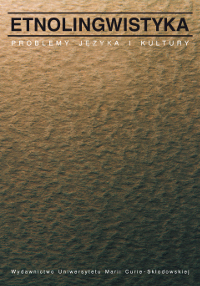РУССКИЙ и РОССИЙСКИЙ в языке метрополии и диаспоры как проекция индивидуальной идентичности
Russkost' and rossiyskost’ in the language of the Russian diaspora as a projection of individual identity
Author(s): Vladislava ŽdanovaSubject(s): Language studies, Language and Literature Studies, Applied Linguistics, Cognitive linguistics
Published by: Wydawnictwo Naukowe Uniwersytetu Marii Curie-Sklodowskiej
Keywords: semantics of russkiy; semantics of rossiyskiy; Russia; diaspora; signs of external identification; signs of internal identification
Summary/Abstract: The author analyzes the changes in the semantics of the Russian words russkiy and rossiyskiy in Russia and in the Russian diaspora. The peculiar nature of these adjectives is directly connected with their identifying function and the changes in their semantics with those in the code of identification of the speakers. For the Russian diaspora in Germany the distinction between the two concepts is not very important because those speakers identify themselves via russkiy, whereas rossiyskiy is treated as its synonym in official style. As a result, the semantics of russkiy is broadened, and the word begins to be used in reference to all manifestations of the Russian presence in the world: political, linguistic, national and religious (thus, russkiy means both ‘Orthodox’ and ‘Soviet’). The broadening is also influenced by the German language. In Russia, russkiy and rossiyskiy may be treated as manifestations of “external” and “internal” identification and individual linguistic preferences may reveal the cultural and political position of the speaker. Consistent use of the russkiy instead of rossiyskiy to refer to state and territorial categories may be a feature of colloquial language as well as a conscious act of objection against the expansion of the latter word. In this way, what is different in Russian and the Russian diaspora in Germany is not only the linguistic but also the semiotic status of the lexemes and their role in the process of the speaker’s self-identification.
Journal: Etnolingwistyka. Problemy Języka I Kultury
- Issue Year: 20/2008
- Issue No: 20
- Page Range: 243-255
- Page Count: 13
- Language: Russian

